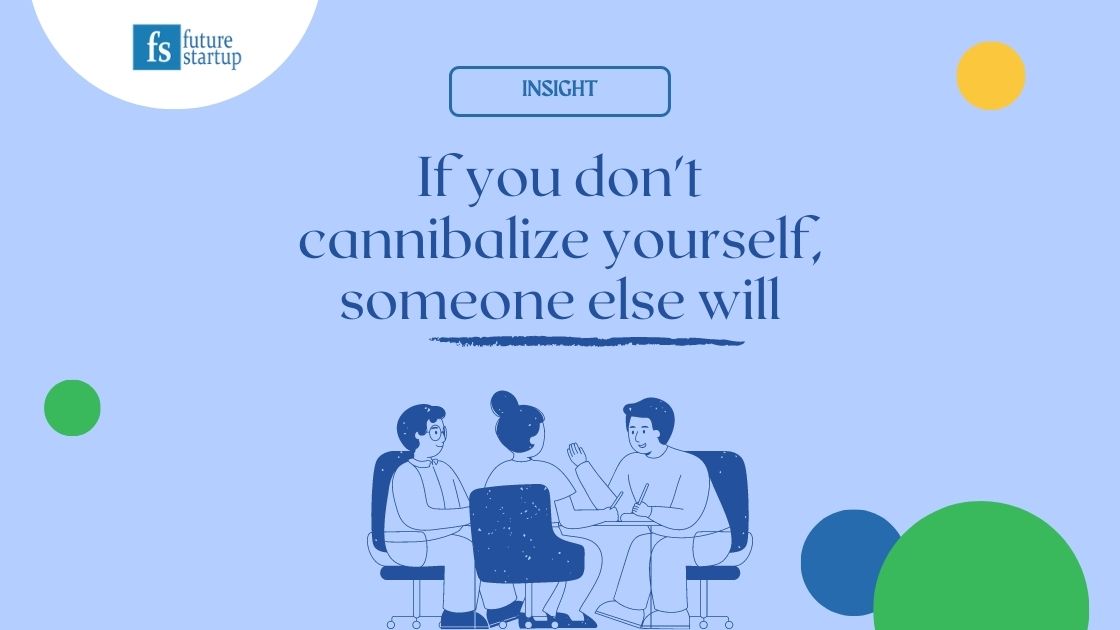
One common challenge successful companies suffer from is the threat of cannibalization. It is one of the outcomes of the innovator’s dilemma.
An innovator’s dilemma happens when a good business overlooks apparent smaller but potentially disruptive opportunities in favor of its existing high-margin business.
This can happen in two ways.
One, it can happen because the company leadership fails to see the future and makes an incorrigible mistake of missing some important market wave.
Second, the company will delay investing in the new innovation despite knowing its potential because it’ll take the investment away from its existing high-margin business and also potentially cannibalize it.
In many ways, it is precisely your inability to wane yourself from the drug despite knowing that it is harmful to you. You avoid taking action even when doing so is apparently the right reason.
The outcome of this ends in the cannibalization of your business by someone external. A competitor. A new upstart and so on. The market moves at its own pace.
If you suffer from an innovator's dilemma and don’t take action, that does not mean that other people will wait for you to do so. Eventually, someone will come and eat into your business. That’s the risk of not cannibalizing yourself when you can — you’ll be cannibalized.
There are several reasons why companies don’t cannibalize themselves.
The first problem comes from a combination of motivated reasoning and survivorship bias. You can call the whole thing wishful thinking.
Motivated reasoning is when you come up with logic and arguments in favor of your already held position and discount every other piece of evidence against your position regardless of its validity.
Survivorship bias is the belief that bad things will only happen to other people but not to you. Other companies will suffer cannibalization but you will not.
This combined psychology leads to an ostrich effect where you assume that the problem will go away if you just ignore it.
The success of the current business also plays a role in all of this. Since your existing business is a high-margin profitable business, it is only logical to double down on it. Apparently, it is the good businesses that suffer from the innovator's dilemma. As Late Harvard Professor Clayton Christensen described:
“The reason [for why great companies failed] is that good management itself was the root cause. Managers played the game the way it’s supposed to be played. The very decision-making and resource allocation processes that are key to the success of established companies are the very processes that reject disruptive technologies: listening to customers; tracking competitors actions carefully; and investing resources to design and build higher-performance, higher-quality products that will yield greater profit. These are the reasons why great firms stumbled or failed when confronted with disruptive technology change.
Successful companies want their resources to be focused on activities that address customers’ needs, that promise higher profits, that are technologically feasible, and that help them play in substantial markets. Yet, to expect the processes that accomplish those things also to do something like nurturing disruptive technologies – to focus resources on proposals that customers reject, that offer lower profit, that underperform existing technologies and can only be sold in insignificant markets– is akin to flapping one’s arms with wings strapped to them in an attempt to fly. Such expectations involve fighting some fundamental tendencies about the way successful organizations work and about how their performance is evaluated.”
As Christensen pointed out it is hard for a successful company to do otherwise. As he wrote: “to expect the processes that accomplish those things also to do something like nurturing disruptive technologies – to focus resources on proposals that customers reject, that offer lower profit, that underperform existing technologies and can only be sold in insignificant markets– is akin to flapping one’s arms with wings strapped to them in an attempt to fly. Such expectations involve fighting some fundamental tendencies about the way successful organizations work and about how their performance is evaluated.”
Christensen suggests that companies have to fundamentally change how they operate if they want to tackle challenges like cannibalization.
When companies succeed, organizations usually break into functional silos: product, sales, marketing, customer support, finance, and so on. Each of these functions then operates as an independent department.
This leads to two second-order consequences. First, things get scattered across operations leaving opportunities to collaborate. Second, individual team members get more focused on the problems in their own departments instead of taking a company-wide approach to seeing the challenges.
Now the question comes as to what can be done to remedy the situation.
One straight-cut initiative that can potentially address part of this challenge is doing the opposite of what caused the problem.
Companies of course should look into their organizational design and move away from functional silos and potentially look to invest in multiple independently managed products.
But the first challenge that must be addressed is psychological — the company must recognize the need for innovation and come out of the need for motivated reasoning.
Unless decisions are made with complete commitment, things are unlikely to turn around. And commitment requires you to unload yourself of motivated reasoning and tendencies like survivorship bias.
Once that part is taken care of making real organizational changes can be reached through informed strategic decisions and rapid trial-and-error experiments. It’s usually better to cannibalize yourself than to get obliterated by someone else.
Originally published on 25 January 2023. Updated on 27 October 2024
